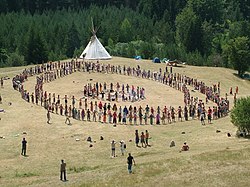
Back Energiemedisyne Afrikaans طب روحاني Arabic Terapia de energía Spanish انرژیدرمانی Persian Pratique énergétique French आध्यात्मिक चिकित्सा Hindi Medicina energetica Italian エネルギー療法 Japanese Enaji medisn JAM ಶಕ್ತಿ ಚಿಕಿತ್ಸೆ Kannada
| This article is part of a series on |
| Alternative medicine |
|---|
 |
| New Age beliefs |
|---|
 |
| Concepts |
| Spiritual practices |
| Doctrines |
Energy medicine is a branch of alternative medicine based on a pseudo-scientific belief that healers can channel "healing energy" into a patient and effect positive results. The field is defined by shared beliefs and practices relating to mysticism and esotericism in the wider alternative medicine sphere rather than any sort of unified terminology, leading to terms such as energy healing or vibrational medicine being used as synonymous or alternative names. In most cases there is no empirically measurable energy involved: the term refers instead to so-called subtle energy. Practitioners may classify the practice as hands-on,[1] hands-off,[1] and distant[1] (or absent) where the patient and healer are in different locations. Many schools of energy healing exist using many names: for example, biofield energy healing,[2][3] spiritual healing,[4] contact healing, distant healing, therapeutic touch,[5] Reiki[6] or Qigong.[2]
Reviews of the scientific literature on energy healing have concluded that there is no evidence supporting clinical efficacy.[7][8][9][10][11][12] The theoretical basis of healing has been criticised as implausible;[13][14][15][16] research and reviews supportive of energy medicine have been faulted for containing methodological flaws[17][18][19] and selection bias,[17][18] and positive therapeutic results have been determined to result from known psychological mechanisms.[17][18] Some claims of those purveying "energy medicine" devices are known to be fraudulent[20] and their marketing practices have drawn law-enforcement action in the US.[20]
- ^ a b c Jules Evans (July 14, 2008). "Spiritual healing on the NHS?". The Times. London. Archived from the original on May 14, 2009.
- ^ a b Network newsletter, MD Anderson Cancer Center (2007). "Energy Medicines: Will East Meet West?". Archived from the original on November 25, 2010. Retrieved November 30, 2010.
- ^ Jain S, Mills PJ (October 2007). "Biofield Therapies: Helpful or Full of Hype?". International Journal of Behavioral Medicine. 17 (1): 1–16. doi:10.1007/s12529-009-9062-4. PMC 2816237. PMID 19856109.
- ^ Ernst E (2001). "A primer of complementary and alternative medicine commonly used by cancer patients". Medical Journal of Australia. 174 (2): 88–92. doi:10.5694/j.1326-5377.2001.tb143161.x. PMID 11245510. S2CID 45055625. Archived from the original on January 29, 2012. Retrieved November 30, 2010.
- ^ "Therapeutic Touch". Cancer.org. June 2, 2008. Archived from the original on May 6, 2015. Retrieved September 20, 2010.
- ^ "Reiki Practice". Nccih.nih.gov. Archived from the original on June 4, 2020. Retrieved September 20, 2010.
- ^ Hall H (January 26, 2010). "Faith Healing". sciencebasedmedicine.org. Archived from the original on November 13, 2020. Retrieved February 29, 2020.
...When faith healings have been diligently investigated by qualified doctors, they have found no evidence that the patients were actually helped in any objective sense. Even at Lourdes, the Catholic Church has only recognized 4 cures since 1978, out of 5 million people who seek healing there every year. There simply is no evidence that faith healing heals. Not what science considers evidence. And the true believers don't value evidence or the scientific method: for them, belief is enough.
- ^ Cite error: The named reference
Abbotwas invoked but never defined (see the help page). - ^
Ernst E. (April 30, 2003). "Distant healing—an update of a systematic review". Wien. Klin. Wochenschr. 115 (7–8): 241–245. doi:10.1007/BF03040322. PMID 12778776. S2CID 28737150.
Since the publication of our previous systematic review in 2000, several rigorous new studies have emerged. Collectively they shift the weight of the evidence against the notion that distant healing is more than a placebo.
- ^ Cite error: The named reference
ernst2006was invoked but never defined (see the help page). - ^ Cite error: The named reference
Pittlerwas invoked but never defined (see the help page). - ^ Cite error: The named reference
TrickOrTreatmentwas invoked but never defined (see the help page). - ^ Cite error: The named reference
GistLubinwas invoked but never defined (see the help page). - ^ Cite error: The named reference
AAQMwas invoked but never defined (see the help page). - ^ Cite error: The named reference
stengerwas invoked but never defined (see the help page). - ^ Cite error: The named reference
Kruglyakovwas invoked but never defined (see the help page). - ^ a b c McCaslin DL (June 2009). "A review of efficacy claims in energy psychology". Psychotherapy. 46 (2): 249–56. doi:10.1037/a0016025. PMID 22122622.
- ^ a b c Pignotti, M., Thyer, B. (2009). "Some comments on "Energy psychology: A review of the evidence": Premature conclusions based on incomplete evidence?". Psychotherapy: Theory, Research, Practice, Training. 46 (2): 257–261. doi:10.1037/a0016027. PMID 22122623. S2CID 20690978.
- ^ Agdal R, von b Hjelmborg J, Johannessen H (2011). "Energy healing for cancer: A critical review". Forschende Komplementärmedizin. 18 (3): 146–54. doi:10.1159/000329316. PMID 21701183. S2CID 23616760.
- ^ a b Cite error: The named reference
SeattleTimeswas invoked but never defined (see the help page).
© MMXXIII Rich X Search. We shall prevail. All rights reserved. Rich X Search